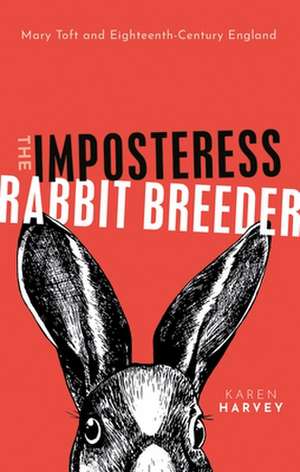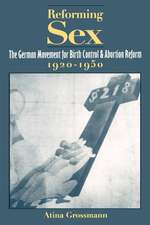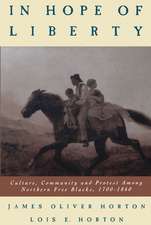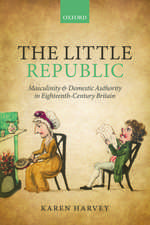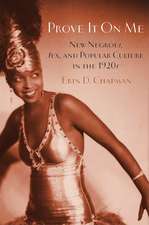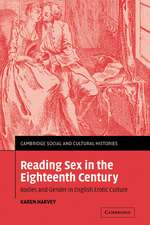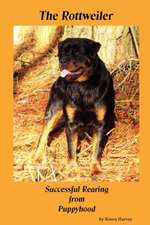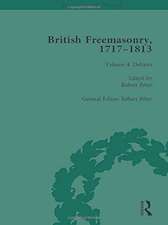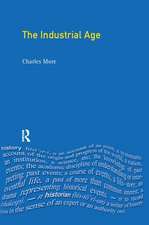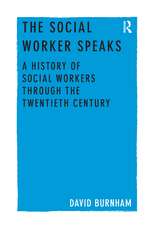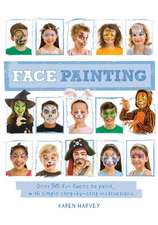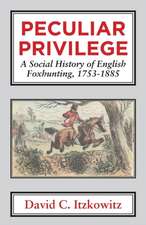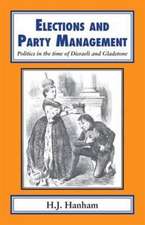The Imposteress Rabbit Breeder: Mary Toft and Eighteenth-Century England
Autor Karen Harveyen Limba Engleză Hardback – 23 ian 2020
Preț: 109.55 lei
Preț vechi: 132.04 lei
-17% Nou
Puncte Express: 164
Preț estimativ în valută:
20.97€ • 21.81$ • 17.31£
20.97€ • 21.81$ • 17.31£
Carte disponibilă
Livrare economică 13-19 martie
Livrare express 07-13 martie pentru 46.47 lei
Preluare comenzi: 021 569.72.76
Specificații
ISBN-13: 9780198734888
ISBN-10: 0198734883
Pagini: 224
Ilustrații: 23 illustrations
Dimensiuni: 141 x 218 x 23 mm
Greutate: 0.34 kg
Editura: OUP OXFORD
Colecția OUP Oxford
Locul publicării:Oxford, United Kingdom
ISBN-10: 0198734883
Pagini: 224
Ilustrații: 23 illustrations
Dimensiuni: 141 x 218 x 23 mm
Greutate: 0.34 kg
Editura: OUP OXFORD
Colecția OUP Oxford
Locul publicării:Oxford, United Kingdom
Recenzii
The story is told well, and its different dimensions all carefully analysed
In a captivating new interpretation, Karen Harvey takes on the well-known tale of Mary Toft giving birth to rabbits and resituates it, bringing considerable erudition, empathy, and energy to the task.
[Harvey's] book provides fascinating insights into the social context surrounding the "Rabbit Woman" case while never losing sight of what remains a rattling good story - a potboiler indeed.
The cultural historian Karen Harvey returns [Mary Toft] to the centre of her own story - and, through her, examines the place of poor women in the 18th century ... Harvey deserves credit for the immense amount of research that has produced what feels like a definitive account ... there is much to be said for the timeliness of this story about credulity and hysteria in the age of science.
The Imposteress Rabbit Breeder is a cracking read of a story that seems impossible to believe but it was all too true.
[An] amply detailed study ... Harvey fills out the case fascinatingly, to create a view of the country and city in a shifting era ... her extraordinary narrative will surely be savoured by a wide audience.
Harvey's clear-eyed authority and strenuous examination of Toft's story lays bare a fascinating moment in English society.
The book's neat and rigorous analysis provides a thought-provoking glimpse into the England of 1726. It is also, rightly, an effort to restore some dignity to the woman at the centre of the story.
Powerful and detailed ... The Imposteress Rabbit Breeder is an engaging and emotive volume, capturing an extraordinary event from the early Georgian era. It should appeal to anyone with an interest in this period, but its broad scope and thorough analysis suggest it will find a much wider readership.
[The Imposteress Rabbit Breeder] is absolutely superb. It's one of the best microhistories that I've read.
Harvey's account of Mary Toft's "births" and their social, medical and cultural contexts, is an excellent demonstration of modern historical scholarship: scrupulously researched from a wide variety of sources, but empathetic in its delivery and tone. It is also an exemplary model for what can be achieved when seemingly anomalous events are examined by way of a deeper dive into their wider social and cultural contexts.
[Harvey] has quarried out information about the culture at the time - the medical world, the world of rich courtiers and noblemen, the condition of the poor both male and female. It is rich in footnotes and in the specialized language of cultural studies ... The story still fascinates.
Harvey's remarkable achievement is to have gripped our attention with this extraordinary but true story.
Harvey offers [...] a new and valuable perspective from which scholars with interests in histories of midwifery, medicine, and gender will gain a great deal ... Harvey's deliberate and well-calculated focus on questions of town and country, man and woman, practitioner and patient is a key strength of this book, and one which changes our perspective on a story we thought we knew well. Accessible and enjoyable for scholars, students, and the public, this book is a valuable and insightful addition to any bookshelf.
A fantastically rich and beautifully executed book.
Harvey uses the famous rabbit birth fraud to train a light on country, town and city, social divisions, female touch and patriarchal power, medicine, the law and politics - and at the heart of it all a piteous woman testifying to her bodily sufferings and visceral losses. A detective story in the noble tradition of Natalie Zemon Davis' The Return of Martin Guerre.
In a captivating new interpretation, Karen Harvey takes on the well-known tale of Mary Toft giving birth to rabbits and resituates it, bringing considerable erudition, empathy, and energy to the task.
[Harvey's] book provides fascinating insights into the social context surrounding the "Rabbit Woman" case while never losing sight of what remains a rattling good story - a potboiler indeed.
The cultural historian Karen Harvey returns [Mary Toft] to the centre of her own story - and, through her, examines the place of poor women in the 18th century ... Harvey deserves credit for the immense amount of research that has produced what feels like a definitive account ... there is much to be said for the timeliness of this story about credulity and hysteria in the age of science.
The Imposteress Rabbit Breeder is a cracking read of a story that seems impossible to believe but it was all too true.
[An] amply detailed study ... Harvey fills out the case fascinatingly, to create a view of the country and city in a shifting era ... her extraordinary narrative will surely be savoured by a wide audience.
Harvey's clear-eyed authority and strenuous examination of Toft's story lays bare a fascinating moment in English society.
The book's neat and rigorous analysis provides a thought-provoking glimpse into the England of 1726. It is also, rightly, an effort to restore some dignity to the woman at the centre of the story.
Powerful and detailed ... The Imposteress Rabbit Breeder is an engaging and emotive volume, capturing an extraordinary event from the early Georgian era. It should appeal to anyone with an interest in this period, but its broad scope and thorough analysis suggest it will find a much wider readership.
[The Imposteress Rabbit Breeder] is absolutely superb. It's one of the best microhistories that I've read.
Harvey's account of Mary Toft's "births" and their social, medical and cultural contexts, is an excellent demonstration of modern historical scholarship: scrupulously researched from a wide variety of sources, but empathetic in its delivery and tone. It is also an exemplary model for what can be achieved when seemingly anomalous events are examined by way of a deeper dive into their wider social and cultural contexts.
[Harvey] has quarried out information about the culture at the time - the medical world, the world of rich courtiers and noblemen, the condition of the poor both male and female. It is rich in footnotes and in the specialized language of cultural studies ... The story still fascinates.
Harvey's remarkable achievement is to have gripped our attention with this extraordinary but true story.
Harvey offers [...] a new and valuable perspective from which scholars with interests in histories of midwifery, medicine, and gender will gain a great deal ... Harvey's deliberate and well-calculated focus on questions of town and country, man and woman, practitioner and patient is a key strength of this book, and one which changes our perspective on a story we thought we knew well. Accessible and enjoyable for scholars, students, and the public, this book is a valuable and insightful addition to any bookshelf.
A fantastically rich and beautifully executed book.
Harvey uses the famous rabbit birth fraud to train a light on country, town and city, social divisions, female touch and patriarchal power, medicine, the law and politics - and at the heart of it all a piteous woman testifying to her bodily sufferings and visceral losses. A detective story in the noble tradition of Natalie Zemon Davis' The Return of Martin Guerre.
Notă biografică
Karen Harvey is Professor of Cultural History at the University of Birmingham. She studied at the University of Manchester and Royal Holloway, University of London and is the author of several works on eighteenth-century Britain. Her books include The Little Republic Masculinity and Domestic Authority in Eighteenth-Century Britain(OUP, 2012), and Reading Sex in the Eighteenth Century Bodies and Gender in English Erotic Culture (CUP, 2008).
